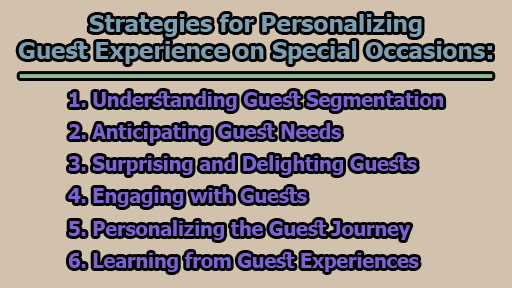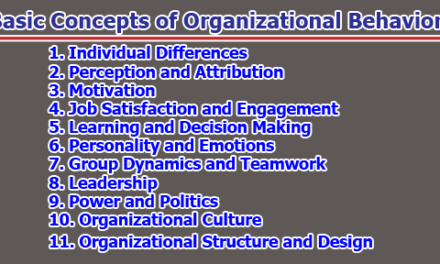Strategies for Personalizing Guest Experience on Special Occasions:
In the competitive landscape of the hospitality industry, creating a memorable and personalized guest experience is crucial for success. Special occasions, such as birthdays, anniversaries, honeymoons, and celebrations, provide a unique opportunity for hospitality managers to go above and beyond, leaving a lasting impression on guests. In this article, we will delve into specific strategies for personalizing guest experience on special occasions, aiming to enhance satisfaction, loyalty, and positive referrals.
1. Understanding Guest Segmentation: The first and foundational strategy for personalization lies in understanding the diverse array of guests who visit a hospitality establishment. By collecting and analyzing data from various sources such as reservation systems, loyalty programs, social media, surveys, and direct communication, managers can gain insights into the preferences, needs, and expectations of their guests. This wealth of information allows for effective guest segmentation, enabling the tailoring of services to different groups based on characteristics, behaviors, and motivations.
Segmentation not only ensures that guests receive services that align with their preferences but also allows for a more targeted and personalized approach. For instance, a couple celebrating their anniversary may appreciate a romantic dinner setup, while a family celebrating a birthday may prefer kid-friendly activities. Knowing the guests on a deeper level sets the stage for a personalized experience that goes beyond a one-size-fits-all approach.
2. Anticipating Guest Needs: Anticipation is a key element in personalizing the guest experience for special occasions. Being proactive and attentive to guests’ requests, questions, and concerns is essential in exceeding expectations. Utilizing data and technology, such as sending pre-arrival emails, offering online check-in and check-out options, and providing personalized recommendations, enables establishments to predict and address guest needs before they arise.
Additionally, staff training plays a crucial role in anticipating guest needs. Empowering employees to be observant and responsive to guest cues, such as recognizing moods, preferences, and interests, enhances the level of service provided. For example, a staff member noticing a couple’s interest in spa services during their honeymoon can proactively offer information on available treatments, adding an extra layer of personalization to their stay.
3. Surprising and Delighting Guests: The strategy of surprising and delighting guests is a powerful tool in creating a personalized experience that surpasses expectations. By combining data insights with creativity, hospitality managers can curate unexpected and thoughtful gestures that add value to a guest’s stay. This could include sending personalized welcome messages, greeting cards, or even small gifts to the guest’s room.
Moreover, surprising and delighting guests can extend to tangible upgrades, such as room or amenity upgrades, exclusive event invitations, or complimentary services. These gestures not only create a sense of delight but also contribute to a positive and lasting memory of the special occasion. Empowering staff to exercise discretion and initiative in surprising guests further enhances the human touch in these personalized moments, fostering a genuine connection.
4. Engaging with Guests: Building rapport and trust is a fundamental aspect of personalizing the guest experience. Communication and technology play a vital role in engaging with guests during their stay and beyond. Follow-up emails, requests for feedback, and expressions of gratitude for choosing the establishment contribute to ongoing engagement.
Encouraging staff to interact with guests in a friendly and professional manner is equally important. Personal touches, such as using guests’ names, remembering preferences, and sharing stories or insights, create a sense of being valued and appreciated. Engaging with guests not only enhances their experience during their stay but also contributes to building a long-term relationship, potentially turning them into loyal patrons.
5. Personalizing the Guest Journey: A seamless and consistent experience across all touchpoints is a hallmark of personalized service. Leveraging data and technology, hospitality establishments can integrate systems and platforms to ensure a cohesive journey for guests. This includes offering omnichannel service and support and providing personalized content and offers that align with the guest’s preferences.
Aligning staff and processes is equally crucial in personalizing the guest journey. Smooth handovers, coordination, and collaboration among different departments and teams contribute to a unified and personalized experience. For instance, information collected during the reservation process can seamlessly transition to the check-in process, ensuring that the guest feels recognized and attended to from the moment they arrive.
6. Learning from Guest Experiences: The final strategy in personalizing guest experiences involves continuous learning and improvement. Leveraging data and technology to measure and evaluate the impact and effectiveness of service strategies is essential. Collecting and analyzing guest feedback, ratings, reviews, and referrals provide valuable insights into areas that require refinement and innovation.
Involving both staff and guests in the learning process fosters a culture of continuous improvement. Soliciting suggestions, ideas, and opinions from both internal and external stakeholders allows for a holistic understanding of what works and what can be enhanced. Recognizing and rewarding contributions to the learning process creates a positive feedback loop, encouraging ongoing innovation and excellence in personalized guest experiences.
In conclusion, creating a personalized guest experience on special occasions requires a strategic blend of data, technology, creativity, and genuine human interaction. Understanding guest segmentation, anticipating their needs, surprising and delighting them, engaging with them, personalizing their journey, and learning from their experiences are integral strategies in this pursuit. In a hospitality landscape where differentiation is key, the art of personalization becomes the cornerstone for establishments aiming to not only meet but exceed guest expectations, leaving an indelible mark on their special moments.

Library Lecturer at Nurul Amin Degree College










